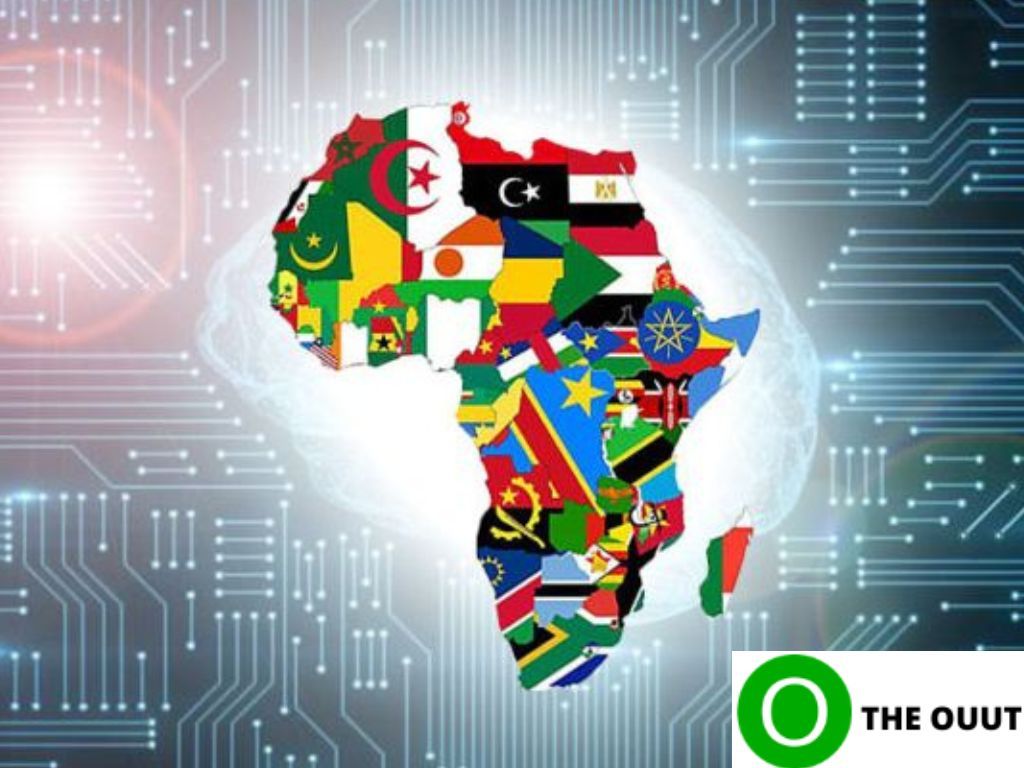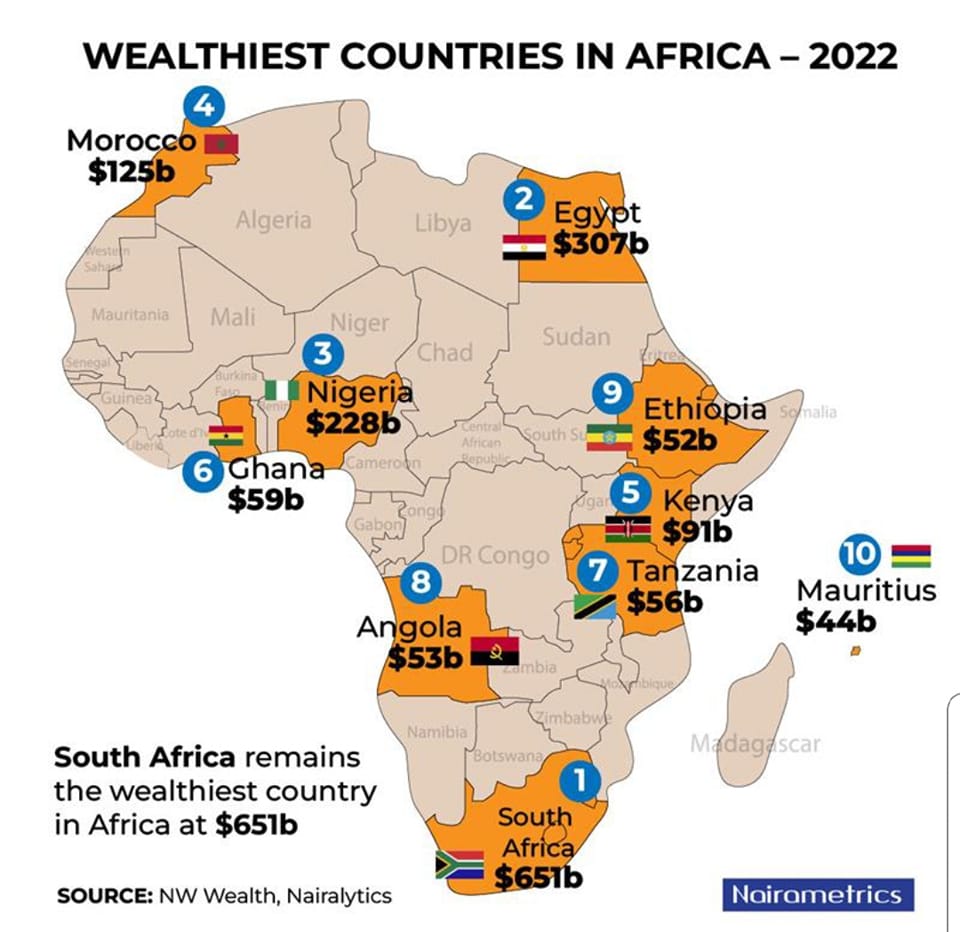The Big 4: A Circle of Wealth Translating into Tech and Startup Development

When You’re Big, You’re Big
In 2020, private wealth and the number of high-net-worth individuals (HNWI) declined by around 9% in Africa as a result of the COVID-19 pandemic. This drop was mostly brought on by wage cuts and job losses in the tourist, hospitality, manufacturing, and real estate sectors, local business closures, a weakening housing market, and rising family debt.
Africa survived, thanks to a number of economic growth policies, favorable macroeconomic indicators, and a thriving IT sector. According to the African Wealth Report 2022, Africa now has $2.1 trillion in total wealth. The establishment of megacities like Lagos, Cape Town, Johannesburg, Cairo, and Nairobi as well as the emergence of numerous wealth sources have increased private wealth, according to reports, despite the fact that growth in total wealth has been stagnant over the past ten years. The best part is that private wealth in Africa is predicted to increase further in the ensuing years.
South Africa, Egypt, Nigeria, Morocco, and Kenya are the “Big 5” wealth markets in Africa; combined, these five nations account for more than 50% of the continent’s total wealth. While Egypt has the most billionaires on the continent, South Africa has more high net worth individuals (HNWIs) than any other country in Africa. Africa’s economies are gradually becoming less reliant on the extractive sector, and conditions for starting businesses are getting better almost everywhere. This change in the way people view money has made Africa’s economic future look promising.
It’s interesting to note that 4 of the top 5 countries are those that have historically dominated the tech sector in Africa. This has demonstrated that wealth creation in Africa has been dominated by the rise of frontier economies, which are drawing new wealth by promoting themselves as preferred tech investment destinations. South Africa, Nigeria, Egypt and Kenya are BIG.
What Makes the Big 4 this Big?
The Biggest of the 4 (South Africa)
According to data from Henley & Partners, South Africa is in first place. The population of South Africa is somewhere about 58 million. It is the most industrialized, technologically advanced, and diversified upper-middle-income economy on the African continent, according to official World Bank figures.
The economy of South Africa is so well-diversified that its stability comes from a multitude of sources. The main contributors to the nation’s gross domestic product are the mining sector, manufacturing, financial services, and tourism (GDP). The country of South Africa is endowed with a wealth of natural resources, such as gold, diamonds, platinum, and iron ore. It is one of the biggest exporters of these materials, especially gold and platinum.
Africa’s two wealthiest cities are in South Africa. Johannesburg is the wealthiest, with total private wealth of US$239 billion, while Cape Town in second place has total private wealth of $131 billion. According to reports, 357 South African startups have secured over $993,684,600, in funding. A figure which is only surpassed by Nigeria.

Administrators in South Africa have had to strike a balance between regulation and innovation where the government, operators, investors, and other stakeholders would be safe and operate for economic growth, development, and sustenance rather than making policy pronouncements that prevent aspiring digital entrepreneurs from exploring and maximizing the digital space.
Second Big 4 (Egypt)
The Egyptian government has expanded support for the nation’s startup environment and efforts to disrupt traditional methods. In recent years, Egypt’s tech and innovation ecosystem has only expanded. As a result, Egypt has seen a rapid increase in the number of companies, which has attracted interest from VCs both domestically and abroad, as well as from worldwide accelerators and tech incubators. Egypt has succeeded in positioning itself as the primary tech powerhouse of North Africa thanks to its capacity to draw growth. Cairo, the capital of Egypt’s Silicon Valley, has proven to be competitive with other, more well-known startup hubs like Lagos, Nairobi, and Cape Town.
Egypt controls $307 billion of the total wealth in Africa. Egypt has a population of 104 million people, making it the third most populated country in Africa. Additionally, Egypt has a diverse economy that is well-developed in fossil, tourism, and agriculture resources, while simultaneously developing a burgeoning information and communication technology industry.
According to an IDC report, the combined IT, BPO, and KPO export markets in Egypt grew from $3.2 billion in 2017 to $4.7 billion in 2020; a value that Egypt has surpassed. In recent times, there’s been an increase in outsourcing jobs and tech companies expanding global delivery centers to the country.
Third Big 4 (Nigeria)
Home to over 211 million people, Nigeria is the most populous African nation. The information and communications technology (ICT) sector generated 18.44% of Nigeria’s GDP in the second quarter of 2022, according to a recent Gross Domestic Product (GDP) report from the National Bureau of Statistics. With a growth rate of 6.55% since Q1 2022, tech industry has become the nation’s largest.
In Nigeria’s fintech industry, disruption is truly taking off. Being named as the top fintech centre in Africa is no small achievement, especially in light of how quickly Nigeria has embraced fintech despite many obstacles. As of September 2022, there were over 19,000 people employed by at least 481 tech firms operating throughout Nigeria. Fintech is the most populated sector, with more than one-third of the country’s tech startups active within the sector. Between 2015 and 2022, 383 tech startups raised a combined $2,068,709,445 a higher total than any other country.
Particularly, Lagos is Africa’s largest tech hub and houses Africa’s second largest number of billionaires. Of the 481 startups active across the country, Lagos leads the way with no fewer than 425 – 88.4%. Generally, Nigeria controls $228 billion of the total private wealth in Africa.
Fourth Big 4 (Kenya)
According to the African Wealth Report, Kenya has $91 billion in private wealth in 2022, ranking fifth in Africa. The country’s economy has been growing steadily over the past ten years, especially in the hospitality and Agritech industries. Only South Africa has a more valuable luxury market in Africa than Kenya.
Amidst issues with food security and the impact of the agriculture industry on the nation’s entire economy, Kenya has become a hotspot for Agritech product development and investment. The economy of Kenya has been transformed by the country’s openness to technology, and Kenya’s farmers have been at the forefront of Africa’s Agritech boom.
